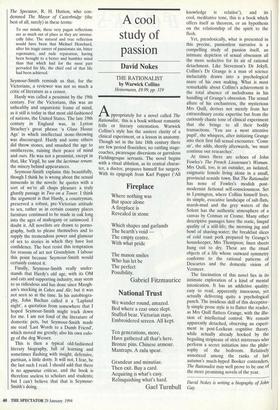A cool study of passion
David Nokes
THE RATIONALIST by Warwick Collins Heinemann, f9.99, pp. 319
Appropriately for a novel called The Rationalist, this is a book without romantic frills or literary ostentation. Warwick Collins's style has the austere clarity of a clinical experiment, or a lesson in anatomy. Though set in the late 18th century there are few period flourishes; no rattling stage- coaches, picaresque diversions or garrulous Fieldingesque servants. The novel begins with a ritual ablution, as its central charac- ter, a doctor, prepares himself for surgery. With its epigraph from Karl Popper (`All
knowledge is relative'), and its cool, meditative tone, this is a book which offers itself as theorem, or an hypothesis on the relationship of the spirit. to the flesh.
Yet, paradoxically, what is presented in this precise, passionless narrative is a compelling study of passion itself, an intimate depiction of sexual obsession all the more seductive for its air of rational detachment. Like Stevenson's Dr Jekyll, Collins's Dr Grange is a man of science ineluctably drawn into a psychological snare of his own making. What is most remarkable about Collins's achievement is the total absence of melodrama in his handling of Grange's obsession. The sexual allure of his enchantress, the mysterious Mrs Quill, derives not merely from her extraordinary erotic expertise but from the curiously chaste tone of clinical experiment that she brings to all their bodily transactions. 'You are a most attentive pupil', she whispers, after initiating Grange into their first full sexual encounter. 'Come sir', she adds, shortly afterwards, 'we must continue our researches'.
At times there are echoes of John Fowles's The French Lieutenant's Woman. Mrs Quill, too, is an outsider, an isolated, enigmatic female living alone in a small, provincial seaside town. But The Rationalist has none of Fowles's modish post- modernist fictional self-consciousness. Set in Lymington, where Collins himself lives, its simple, evocative landscape of salt-flats, marsh-mud and the grey waters of the Solent has the authentic atmosphere of a canvas by Cotman or Crome. Many other descriptive passages have the static, limpid quality of a still-life; the morning jug and bowl of shaving-water; the breakfast slices of cold roast pork prepared by Grange's housekeeper, Mrs Thompson; linen sheets hung out to dry. These are the ritual objects of a life whose outward symmetry conforms to the rational patterns of Descartes and the domestic vision of Vermeer.
The fascination of this novel lies in its intimate exploration of a kind of mental intoxication. It has an addictive quality; easy to read, apparently innocuous, yet actually delivering quite a psychological punch. The insidious skill of this deceptive- ly simple prose style is to flatter the reader, as Mrs Quill flatters Grange, with the illu- sion of intellectual control. We remain apparently detached, observing an experi- ment in post-Lockean cognitive theory, while actually already hooked by the beguiling striptease of strict mistresses who perform a secret initiation into the philo- sophy of the bedroom. Relatively unnoticed among the ranks of last
autumn's much-hyped Booker contenders, The Rationalist may well prove to be one of the more promising novels of the year.
David Nokes is writing a biography of John Gay.


































































 Previous page
Previous page